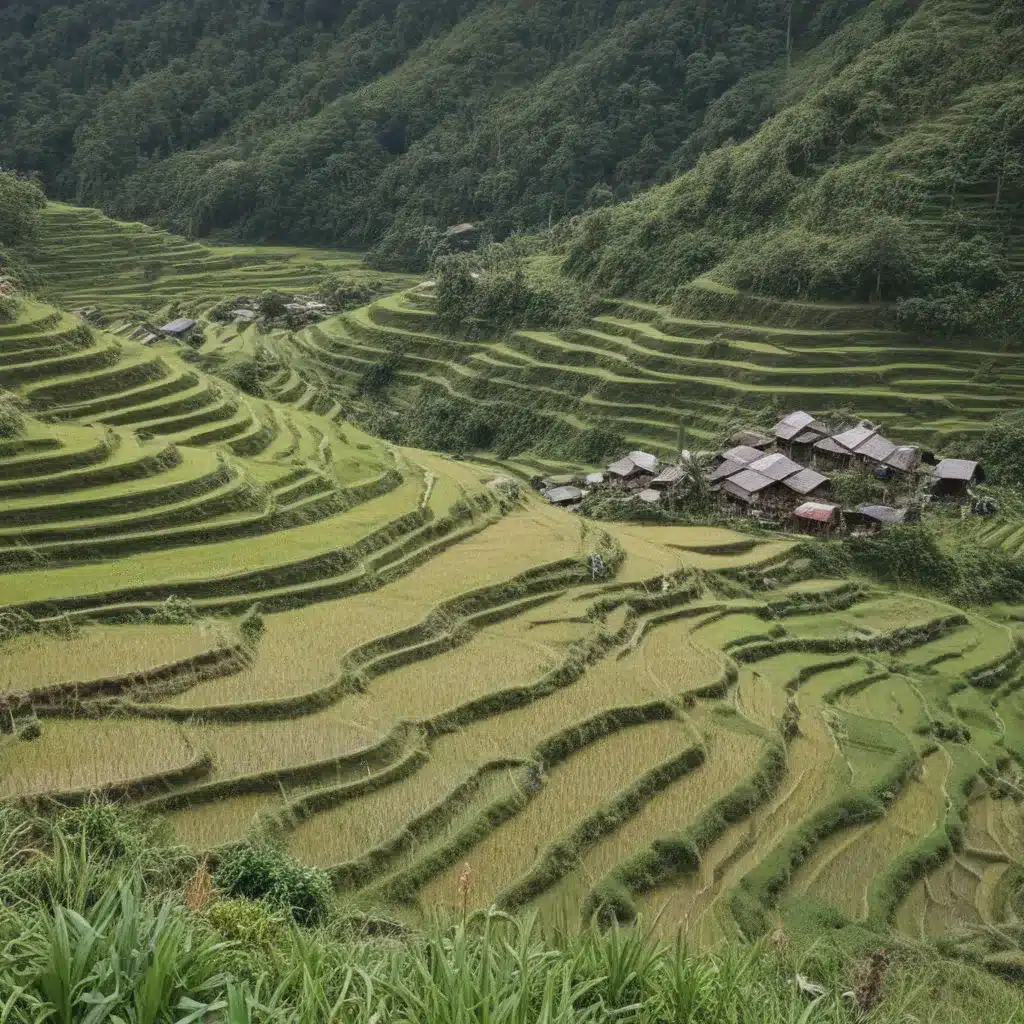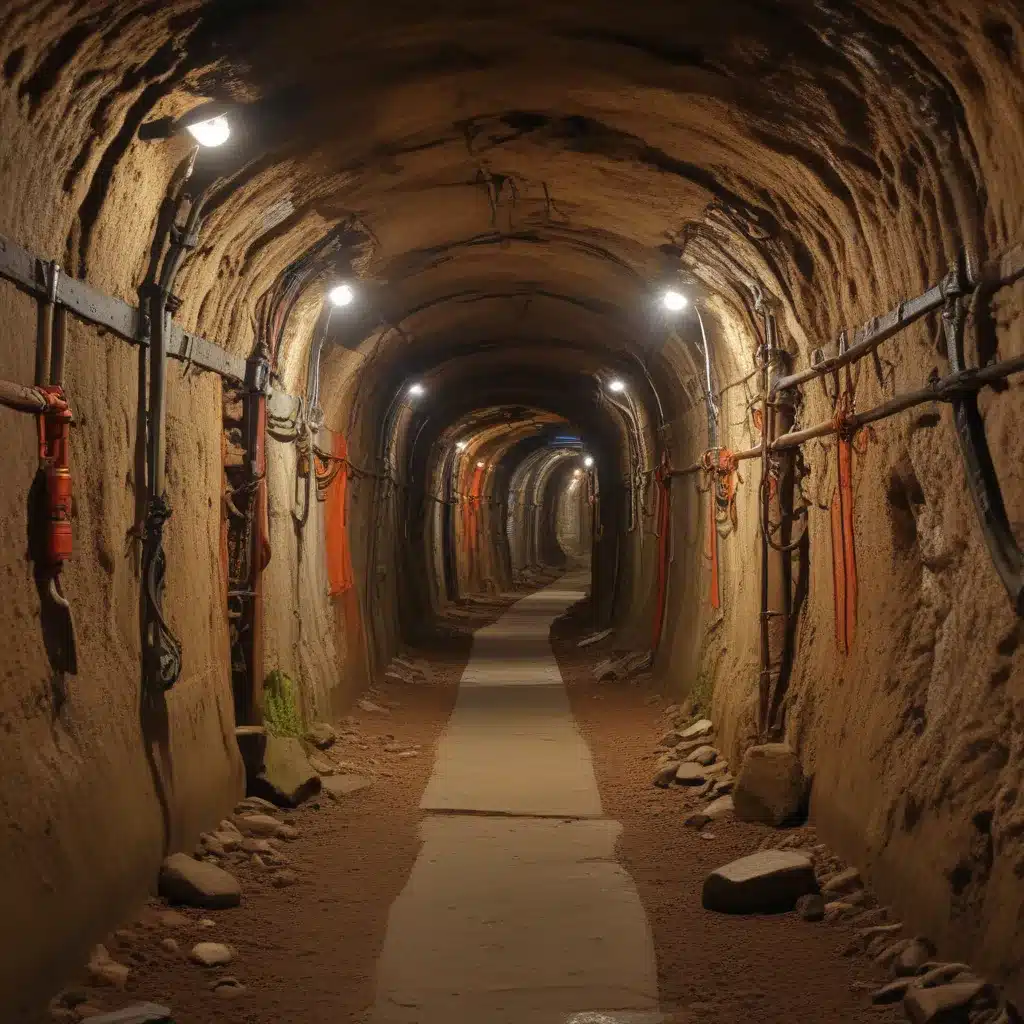
The Enchanting Ifugao Rice Terraces
The Philippines – a land of captivating landscapes, vibrant cultures, and extraordinary culinary delights. And nestled high in the lush, verdant mountains of Northern Luzon lies a truly mesmerizing sight: the Ifugao Rice Terraces. These ancient, hand-carved stone and mud structures, sculpted into the slopes over centuries, are a breathtaking feat of engineering and a testament to the ingenuity of the Ifugao people.
As I stand at the edge of these cascading green steppes, I can’t help but be awestruck by their sheer scale and beauty. The terraces seem to stretch endlessly, following the contours of the mountainside like a verdant quilt. The patchwork of glistening paddies, framed by towering peaks, creates a scene that is nothing short of magical.
But the Ifugao Rice Terraces are more than just a picturesque wonder – they are a living, breathing embodiment of a rich cultural heritage. The Ifugao people have meticulously maintained these terraces for generations, using traditional farming techniques passed down through the centuries. It is a symbiotic relationship, where the land nurtures the people, and the people, in turn, care for the land.
Discovering the Flavors of Ifugao Cuisine
As I immerse myself in the enchanting world of the Ifugao, I find that their culinary traditions are just as captivating as their architecture. The Ifugao cuisine is a harmonious blend of flavors, reflecting the unique terroir of the region and the deep-rooted connection between the people and their environment.
One of the staple ingredients in Ifugao cooking is, of course, the humble rice. Harvested from the very same terraces that dot the landscape, the rice is the foundation upon which many of the local dishes are built. Whether steamed to perfection, or transformed into fragrant, sticky delicacies, this grain is truly the heart and soul of Ifugao cuisine.
But the Ifugao culinary repertoire extends far beyond just rice. The region’s rich biodiversity provides a bounty of other ingredients, from freshwater fish and crustaceans plucked from the nearby streams, to an array of endemic vegetables and herbs that thrive in the cool, mountain air. These local, seasonal ingredients are the lifeblood of Ifugao cooking, imbuing each dish with a distinct sense of place and time.
As I sit down to enjoy a traditional Ifugao meal, I am struck by the depth of flavor and the intricate balance of textures. The fragrant rice is complemented by the subtle, earthy notes of sautéed greens, the tender, flaky flesh of grilled fish, and the satisfying crunch of freshly pickled vegetables. Every bite is a revelation, a symphony of tastes that transports me to the heart of this remarkable culture.
Preserving Culinary Traditions
But the Ifugao culinary story is not just about the flavors on the plate – it is also a tale of resilience, adaptation, and the preservation of age-old traditions. In a world that is rapidly changing, the Ifugao people have worked tirelessly to maintain the integrity of their culinary heritage, even in the face of modernization and external influences.
One of the key ways they have done this is through the cultivation of heirloom rice varieties. These ancient strains, carefully selected and nurtured over generations, not only possess unique flavor profiles but also hold deep cultural significance for the Ifugao people. By continuing to grow and harvest these heritage grains, the Ifugao are not only preserving the taste of their past but also ensuring the survival of their culinary identity.
Another crucial aspect of Ifugao food culture is the role of community and shared knowledge. Cooking is often a communal affair, with elders passing down their skills and recipes to younger generations. This collaborative approach not only fosters a sense of unity and tradition but also ensures that the Ifugao culinary legacy remains intact, even as the world around them changes.
As I delve deeper into the Ifugao way of life, I am struck by the profound respect and reverence they hold for their food. Every ingredient, every dish, is imbued with a deep, spiritual significance, a connection to the land and the ancestors who have come before. It is a humbling reminder of the importance of preserving our culinary traditions, of honoring the stories and the people behind the flavors we savor.
Exploring the Ifugao Way of Life
But the Ifugao story is not just about food – it is a tapestry of rich cultural traditions that are woven into the very fabric of their daily lives. From their intricate textile and weaving practices to their unique architectural styles, the Ifugao people have a deep-rooted connection to their heritage that is truly awe-inspiring.
One of the most captivating aspects of Ifugao culture is their vibrant, colorful textiles. The intricate patterns and designs found on their traditional garments, such as the woven ‘bahag’ loincloths and the intricately embroidered ‘pinugo’ dresses, are a testament to the remarkable skills of Ifugao artisans. These textiles not only serve as a means of cultural expression but also hold deep symbolic meaning, representing the Ifugao’s connection to the natural world and their ancestral traditions.
Another facet of Ifugao culture that truly fascinates me is their unique architectural style. The Ifugao ‘Bale’ houses, with their distinctive, sloping roofs and sturdy, wooden structures, are not only visually striking but also perfectly adapted to the region’s challenging climate and terrain. The attention to detail and the harmonious integration of these dwellings with the surrounding landscape is a testament to the Ifugao’s deep understanding of their environment and their remarkable engineering prowess.
As I explore the Ifugao villages, I am struck by the sense of community and the deep-rooted traditions that permeate every aspect of their lives. From the communal rice harvests to the vibrant, ritualistic festivals, the Ifugao people have a profound respect for their cultural heritage and a steadfast determination to preserve it for generations to come.
Sustainable Tourism and the Ifugao Way
In recent years, the Ifugao Rice Terraces have become a major draw for tourists from around the world, who come to witness the breathtaking beauty of these ancient structures and to immerse themselves in the rich cultural tapestry of the Ifugao people. But with this increased attention, there have also been concerns about the impact of tourism on the delicate ecosystem and the traditional way of life.
Thankfully, the Ifugao people have been proactive in embracing a model of sustainable tourism that not only preserves their cultural heritage but also provides economic opportunities for their communities. By inviting visitors to participate in traditional farming practices, to learn the art of weaving and textile design, and to savor the flavors of Ifugao cuisine, the Ifugao people are able to share their way of life with the world while also ensuring the long-term viability of their cherished traditions.
One particularly inspiring initiative is the Ifugao Heirloom Rice Project, which aims to not only revive the cultivation of ancient rice varieties but also to connect these grains to the global market. By showcasing the unique flavor profiles and the cultural significance of these heirloom strains, the Ifugao people are able to generate sustainable income while also preserving their culinary legacy.
As I reflect on my time in the Ifugao region, I am struck by the profound sense of resilience and adaptability that permeates every aspect of their culture. In the face of modernization and external pressures, the Ifugao people have remained steadfast in their commitment to their traditions, finding innovative ways to share their heritage with the world while also safeguarding the delicate balance of their environment.
Conclusion: Embracing the Ifugao Way
The Ifugao Rice Terraces and the rich tapestry of Ifugao culture are truly a testament to the power of human ingenuity, resilience, and a deep, abiding connection to the land. As I prepare to depart this enchanting region, I am filled with a profound sense of gratitude and a renewed appreciation for the importance of preserving our cultural legacies.
Through my journey, I have learned that the Ifugao way of life is not just about the stunning landscapes or the delectable cuisine – it is a holistic, harmonious approach to living that is deeply rooted in respect, community, and a reverence for the natural world. It is a model that we would all do well to learn from, as we grapple with the myriad challenges of the modern world.
So, if you find yourself drawn to the allure of the Philippines, I urge you to venture beyond the beaches and the bustling cities, and to discover the enchanting world of the Ifugao. Immerse yourself in their culinary traditions, explore their rich cultural heritage, and bask in the breathtaking beauty of the rice terraces. For in doing so, you will not only uncover a truly remarkable way of life, but you will also find a deeper connection to the land, the people, and the timeless traditions that have sustained them for generations.
Embark on your own adventure in the Philippines with Philippine Getaway. Discover the wonders of Ifugao and so much more, from weekend getaways to cultural explorations, adventure sports, and wellness retreats.


